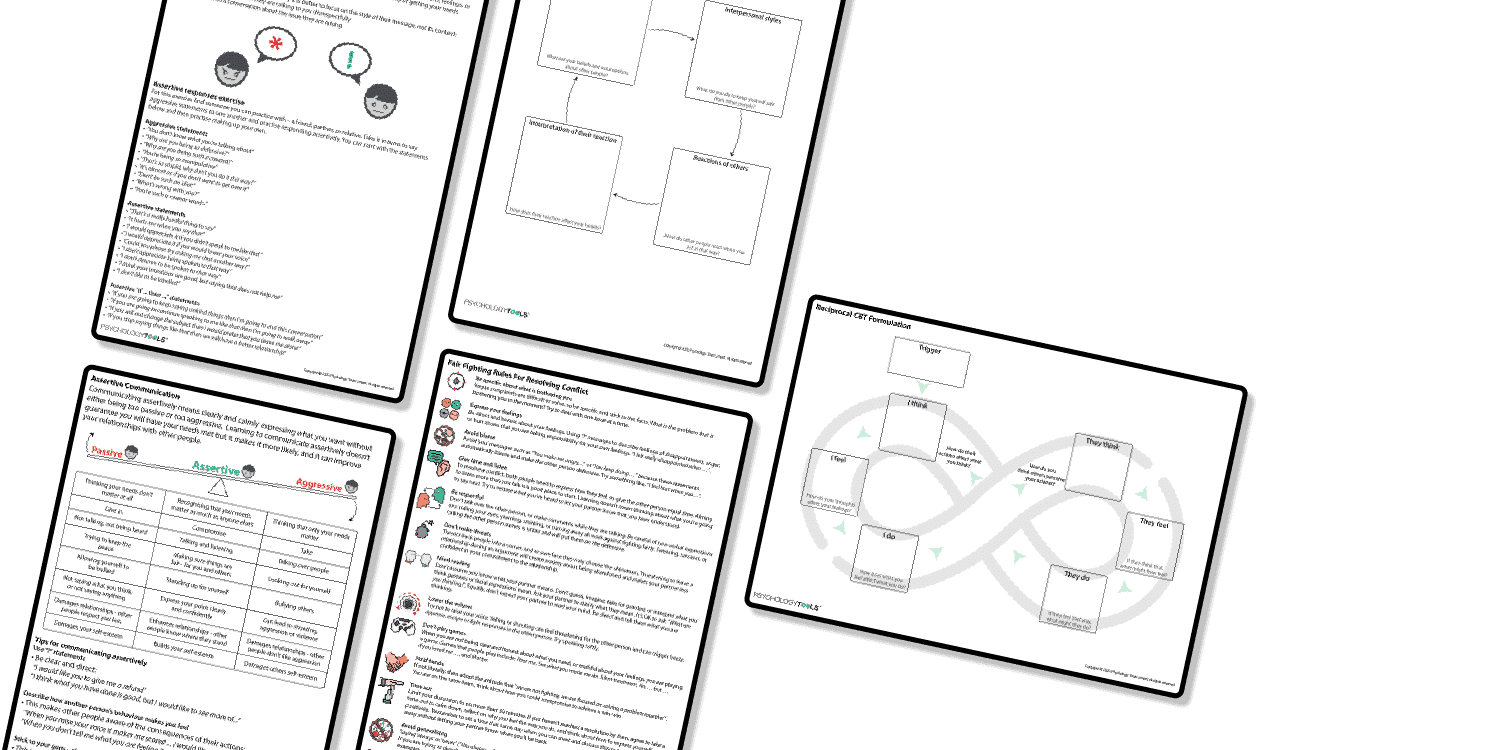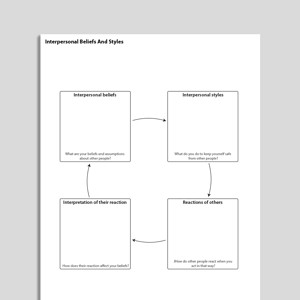Interpersonal Therapy (IPT)
Interpersonal Psychotherapy (IPT) is a short-term psychological (talking) therapy. Its foundations lie in attachment theory (Bowlby, 1969), communication theory (e.g., Kiesler, 1996), and social theory (e.g., Henderson, Byrne, Duncan-Jones, 1982). IPT therapists pay particular attention to their clients’ relationships with other people. The IPT model says that we can change how we feel by improving our network of relationships with other people. Read more

8 of 8 resources
Assertive Communication
Communicating and acting assertively is an interpersonal skill that helps people to maintain healthy relationships, resolve interpersonal conflict, an ...
https://www.psychologytools.com/resource/assertive-communication/
Assertive Responses
Being able to communicate assertively is an essential skill for developing and maintaining healthy relationships and positive self-esteem. Individuals ...
https://www.psychologytools.com/resource/assertive-responses/
Fair Fighting Rules For Resolving Conflict
Fair fighting is a collection of rules that individuals can use to manage conflict effectively, so that it is ‘fair’ and works towards a resolutio ...
https://www.psychologytools.com/resource/fair-fighting-rules-for-resolving-conflict/
Enhancing Sexuality: A Problem-Solving Approach To Treating Dysfunction (Second Edition): Workbook
Enhancing Sexuality: A Problem-Solving Approach to Treating Dysfunction (Second Edition) comes in two volumes. This page is for the Client Workbo ...
https://www.psychologytools.com/resource/enhancing-sexuality-a-problem-solving-approach-to-treating-dysfunction-second-edition-workbook/
Enhancing Sexuality: A Problem-Solving Approach To Treating Dysfunction (Second Edition): Therapist Guide
Enhancing Sexuality: A Problem-Solving Approach to Treating Dysfunction (Second Edition) comes in two volumes. This page is for the Therapist Gui ...
https://www.psychologytools.com/resource/enhancing-sexuality-a-problem-solving-approach-to-treating-dysfunction-second-edition-therapist-guide/
Unforgiveness – The Hook
Everyone experiences hurts and transgressions. When an offence occurs, people often react with anger, fear, or sadness. When these responses persist, ...
https://www.psychologytools.com/resource/unforgiveness-the-hook/
Reciprocal CBT Formulation
CBT therapists often describe finding it difficult to apply CBT skills when clients bring relational problems to therapy. Familiar methods of visu ...
https://www.psychologytools.com/resource/reciprocal-cbt-formulation/
Interpersonal Beliefs And Styles
Interpersonal issues and relationship problems form an important part of what clients bring to therapy: they might present as clients’ current conce ...
https://www.psychologytools.com/resource/interpersonal-beliefs-and-styles/
Links to external resources
Psychology Tools makes every effort to check external links and review their content. However, we are not responsible for the quality or content of external links and cannot guarantee that these links will work all of the time.
Information Handouts
- Relationships are important for our health | Goodmedicine.org
Information (Professional)
- Interpersonal Psychotherapy – the model | Roslyn Law | 2010
- Curriculum for practitioner training in Interpersonal Psychotherapy | Roslyn Law
Protocols
- Group IPT for depression manual (WHO) | Lena Verdeli, Kathleen Clougherty, Myrna M Weissman, Mark van Ommeren and Kenneth Carswell | 2016
Presentations
- Interpersonal Psychotherapy for depression | Paul Wilkinson | 2012
- Interpersonal Psychotherapy: Techniques, supervision | Christopher Gale | 2007
- Implementing Interpersonal Psuchotherapy (IPT) for eating disorders | Rob Welch, Dr Denise Wilfley | 2013
Video
- What is interpersonal psychotherapy? video
- Interpersonal Psychotherapy – panel discussion youtube.com: part 1, part 2, part 3
- Demonstration lecture video
Recommended Reading
- Cuijpers, P., Donker, T., Weissman, M. M., Ravitz, P., & Cristea, I. A. (2016). Interpersonal psychotherapy for mental health problems: a comprehensive meta-analysis.American Journal of Psychiatry,173(7), 680-687.
- de Mello, M. F., de Jesus Mari, J., Bacaltchuk, J., Verdeli, H., & Neugebauer, R. (2005). A systematic review of research findings on the efficacy of interpersonal therapy for depressive disorders.European archives of psychiatry and clinical neuroscience,255(2), 75-82.
- Klerman, G. L., & Weissman, M. M. (1994).Interpersonal psychotherapy of depression: A brief, focused, specific strategy. Jason Aronson, Incorporated.
- Markowitz, J. C., Lipsitz, J., & Milrod, B. L. (2014). Critical review of outcome research on interpersonal psychotherapy for anxiety disorders.Depression and anxiety,31(4), 316-325.
References
- Bowlby, J. (1969). Attachment and loss: Volume I. Attachment. London: The Tavistock Institute of Human Relations.
- Henderson, S., Byrne, D. G., & Duncan-Jones, P. (1982). Neurosis and the social environment. Sydney, Australia: Academic Press.
- Kiesler, D. J. (1996). Contemporary interpersonal theory and research: Personality, psychopathology, and psychotherapy. New York: Wiley.







